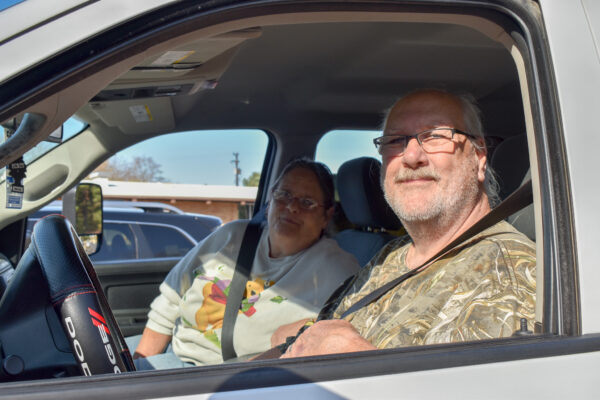When he was a trash truck driver, Dave built relationships with many people in his area. He remembers receiving numerous gifts from neighbors, especially around the holidays, as a token of their gratitude for the service he was doing. He also recalls people sitting outside and waiting for him to come by, just so they would have someone to talk to.
Now, Dave is retired and lives with his wife and son. He and his wife are both living on social security benefits. He comes to Mobile Food Pantries to get food to supplement the food his family is able to purchase, which gives them the ability to spend their money on other necessities, like gas and medical bills.
He found out about the Mobile Food Pantry program through word of mouth.
“I’ve been coming for four years now. I’ve met a bunch of really great, nice people. Not just clients, volunteers, everybody. They talk to you, not at you. That goes a long way with me.”
If he ever receives food that he isn’t able to use, he shares with his neighbors.
Retirees, Gary and Kathy also attend Mobile Food Pantries so they don’t have to choose between paying for food and other necessities.

“When you’re on a fixed income you have to decide where the money is good for, and feeding doesn’t always come first. Paying bills comes first.”
As prices in the stores have risen, it has become more difficult to buy food they would like. They have found that the food they get from the Mobile Pantries, “is stuff we usually don’t buy in the grocery store because it’s so expensive.”
According to the US Department of Agriculture, all food prices are 11.2% higher than they were a year ago. Products such as pork, poultry, milk, eggs, fruits and vegetables have seen especially high prices this year.

Linda, the Harbert Community Church Mobile Food Pantry coordinator, has witnessed many people get back on their feet after showing up to receive food. This Mobile Pantry partners with a local organization, Neighbor to Neighbor, which aims to “help people who need utilities paid.” This connection allows neighbors to seek further help—apart from the food they receive at the Mobile Pantry—if they need it.
“We’ve seen people find homes because we’ve started them out with food. We’ve had a veteran who’s a single father who was able to get him and his daughter out of his car. I had one woman who lost her husband, she has four boys in high school, and now she’s stopped coming to the pantry after three years. She’s going back to school, she’s on her feet. I had one lady who called me up and said ‘I’m on my feet’ and she donated.”
Thanks to the Pokagon Fund and the United Way of Southwest Michigan, neighbors are able to enjoy food without having to make the impossible decision between buying groceries and paying bills.

Story written by Content Specialist Kelly Reitsma

